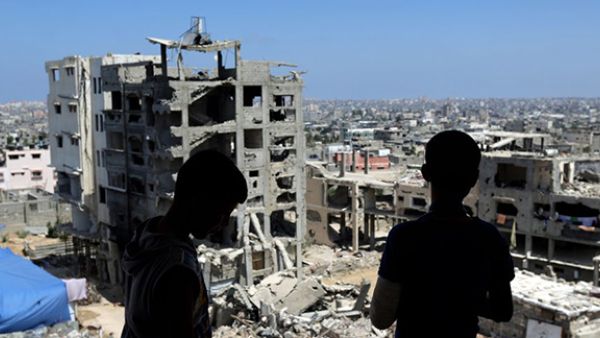Living on a farm in Beit Hanoun on the northern border of Gaza, the Awad family has witnessed far more violence and than most should ever have to experience. They have dealt with more than their fair share of trauma.
In areas near to the Palestinian Authority-governed "buffer zone" between Hamas' Gaza and Israel proper, shelling by the Israeli military is a common occurrence. In times of war, these areas are hit even harder.
Driving through these border areas, the devastation is unmistakable, with blackened shells of buildings lining the road as the separation wall that keeps Gaza's residents separate from the outside world extends across the horizon as far as the eye can see.
The frequent small-scale operations of the Israeli military here highlight the fragility of the situation.
"This prompts a relapse in many patients, undoing the improvement that has been made and plunging sufferers right back into the dark, often bringing worse symptoms than before," explains Rasha Qandeel, director of the Palestine Trauma Centre.
Mental health problems are widespread here in the Gaza Strip, with many obstacles standing between those in need and the treatment they require.
Lack of services, cost - and, above all, the cultural stigma attached to admitting these problems exist - means many bury their deteriorating conditions and fall off professionals' radar.
Reasons for the shame and embarrassment attached to mental instability can vary between communities. For some, it is seen as a sign that you are not treading the right path with regards to your religion, whereas for others it is more of a social stigma and is particularly identifiable when questions of marriage are raised.
According to the World Health Organisation between 10 and 20 percent of the population here have severe mental illness. Already a high proportion, the reality is likely to be much worse, with many sufferers not accounted for - and therefore unlikely to be receiving treatment.
In the past, the prevalence of depression and stress disorders have increased and then fallen as violence peaks and wanes, however since 2014, research by the Palestine Trauma Center (PTC) has noticed an alarming increase that deviates from the trend.
Similarly, before 2014, those reporting symptoms of traumawere largely concentrated in the border areas between Israeli and the Gaza Strip. But since the devastation of Operation Protective Edge, the effects of trauma have spread all across the strip.
The global move in recent decades towards wider societal understanding of mental health is fundamental, and must be nurtured, promoted and supported not least in areas where violent traumatic events are most common.
By Hannah Ware
This article has been edited from the source material.








